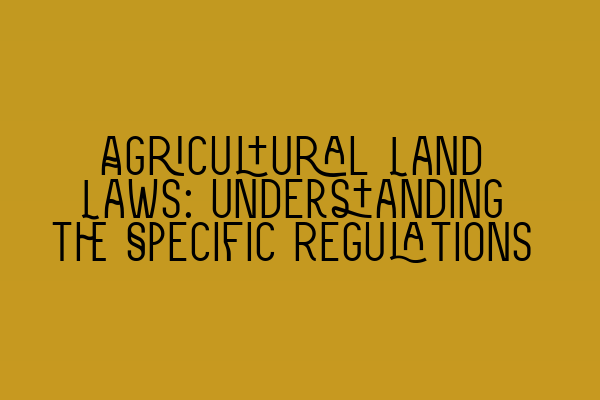Agricultural Land Laws: Understanding the Specific Regulations
As a property owner or someone involved in the agricultural industry, it is crucial to have a solid understanding of agricultural land laws and the specific regulations that govern them. This knowledge will not only help you navigate the legal complexities but also ensure that you comply with the pertinent regulations. In this blog post, we will discuss the key aspects of agricultural land laws and provide you with a comprehensive guide to understanding these regulations.
Before delving into the specifics, it is important to note that agricultural land laws can vary from country to country and even within different regions of the same country. Therefore, it is crucial to consult with a qualified solicitor who specializes in agricultural land law in your jurisdiction to ensure accurate and up-to-date advice.
1. Agricultural Land Eligibility
First and foremost, it is essential to determine whether your land qualifies as agricultural land. Different jurisdictions have different criteria for classifying land as agricultural, and it is important to meet these criteria in order to benefit from the agricultural land laws and regulations. For instance, in the UK, agricultural land is defined as land used for agricultural purposes, including the keeping of livestock or the growing of crops.
2. Planning Permissions and Development Rights
When it comes to agricultural land, planning permissions and development rights play a significant role. Understanding the restrictions and allowances related to land use and development is crucial for any landowner or farmer. In some cases, obtaining planning permission may be required before undertaking certain agricultural activities or making changes to the land. It is advisable to consult with a solicitor who specializes in agricultural land law to navigate through the permitting process efficiently.
3. Tenancy Agreements
Agricultural tenancy agreements are an integral part of agricultural land laws. These agreements define the relationship between landlords and tenants and outline the rights and responsibilities of each party. Depending on your jurisdiction, different types of tenancy agreements, such as farm business tenancies, traditional agricultural leases, or grazing agreements, may be applicable. It is important to have a clear understanding of the terms and conditions set out in these agreements to ensure a smooth and fair landlord-tenant relationship.
4. Environmental Regulations
In recent years, environmental regulations have become increasingly important in the agricultural sector. These regulations aim to protect the environment, wildlife, and public health by regulating practices such as pesticide use, waste management, and land drainage. Compliance with these regulations is crucial to avoid legal issues and potential penalties. Working closely with a solicitor who specializes in agricultural land law can help ensure that you are aware of and compliant with the relevant environmental regulations.
5. Subsidy Schemes and Grants
Many jurisdictions offer subsidy schemes and grants to support the agricultural industry. These schemes may include incentives for sustainable farming practices, environmental conservation, or rural development. In order to benefit from these schemes and grants, it is important to understand the eligibility criteria, application processes, and compliance requirements. Consulting with a solicitor who specializes in agricultural land law can help you navigate through these schemes and ensure that you maximize your chances of obtaining financial support.
In conclusion, understanding agricultural land laws and the specific regulations that govern them is of utmost importance for anyone involved in the agricultural sector. From eligibility criteria to planning permissions, tenancy agreements, environmental regulations, and subsidy schemes, there are several key aspects to consider. To ensure that you have accurate and up-to-date advice, it is highly recommended to consult with a qualified solicitor who specializes in agricultural land law in your jurisdiction.
For further assistance in preparing for legal exams related to property law and land law, consider enrolling in our SQE 1 and SQE 2 preparation courses. Our courses are designed to help you succeed in your exams and provide you with the knowledge and skills necessary to excel in your legal career. Additionally, you may find it helpful to test your knowledge with our SQE 1 practice exam questions and practice mocks FLK1 FLK2. To stay up to date with the latest SRA SQE exam dates, click here.
Remember, being well-informed about agricultural land laws is vital for navigating the complexities of the industry and ensuring compliance with the regulations in force.
